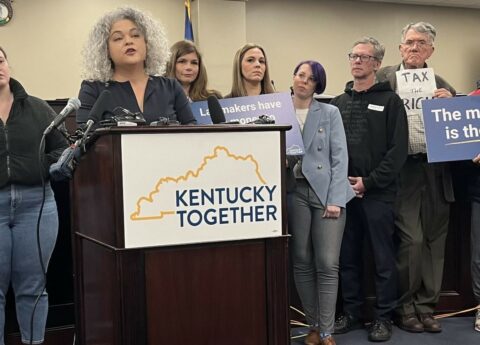A new report released today by the Kentucky Public Pension Coalition (KPPC) shows how switching to a 401(k)-type retirement plan (also known as a defined contribution system) will not help Kentucky’s pension funding challenge but make it harder to pay down liabilities while harming the workforce and economy.
Key findings from the report, authored by the Kentucky Center for Economic Policy (KCEP) and the Keystone Research Center of Pennsylvania, include:
- A switch to a defined contribution plan would make it more expensive to pay down existing unfunded liabilities, as shown in studies from 14 different states that have considered such a change. Moving to 401(k)s involves closing the existing defined benefit plans to new members, which requires adopting a more conservative portfolio in the closed plans leading to lower investment returns over time.
- Defined contribution plans would fail to save money on new workers because the employer contributions in the state’s defined benefit plans are already modest, especially after several rounds of benefit cuts in recent years. Defined contribution plans are also far less efficient, costing between 42 and 93 percent more to deliver the same retirement benefit as a defined benefit plan.
- Worsening benefits by switching to 401(k)-style plans would make it harder to attract and retain a skilled workforce, especially since public employees already make less in total compensation than private sector peers.
- Switching would weaken local economies, where Kentucky state and local pension benefits inject $3.4 billion every year.
The downsides of defined contribution plans are why almost no state has adopted them among the many that have considered doing so. One state, West Virginia, moved to a 401(k)-type plan for its teachers in 1991 but reversed course 15 years later because of lower investment returns and a teaching workforce that was woefully unprepared for retirement.
“Far from solving our pension liabilities, switching to a 401(k)-style plan can actually make costs rise while harming workers and communities,” one of the report’s authors, KCEP Executive Director Jason Bailey, said. “We encourage lawmakers to take heed of the findings of other states and experts before heading down that path.”
State lawmakers have repeatedly said they will take up changes to the pension systems as part of a special session later this year. While no plan has been publicly revealed, many have referenced switching to a 401(k)-style plan as part of what is under consideration.
Kim Ludwig, teacher from Bullitt County, said:
“As the report states a defined contribution 401(k) plan is not significantly cheaper for the state because the existing defined benefit plans are very inexpensive as long as they’re properly funded. Payments to the fund would still be necessary, while introducing new costs to fund the defined contribution 401(k) plan.”
The Kentucky Public Pension Coalition is a coalition of organizations representing current and retired state workers, including first responders, teachers and other state workers, as well as allied organizations.
Brian O’Neill, a firefighter from Louisville, said:
“Switching to a 401(k)-style system will have zero benefit for our state. It is not a retirement. All this gloom and doom talk is just a typical Wall Street parlor trick that will move money from the workers who earned it to the hedge fund types that want so badly to get their hands on it. The only way to address the unfunded liability of KRS is for the state legislature to pay their bills and stop falling for the special interest’s 401(k) trap.”
Click for a copy of the report, as well as a one-pager with the report’s main points



